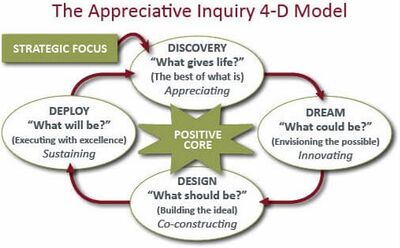Appreciative Inquiry
Appreciative Inquiry (AI) is a positive approach to leadership development and organizational change. The method is used to boost innovation among organizations. A company might apply appreciative inquiry to best practices, strategic planning, organizational culture, and to increase the momentum of initiatives. This approach has also been applied at the societal level for discussion on topics of global importance. For example, non-profit and non-governmental organizations (NGOs) might design initiatives across global regions and industry sectors after analysis using appreciative inquiry.[1]
Components of Appreciative Inquiry[2]
Whether using Appreciative Inquiry one-on-one, or with 1,000 people, the AI process will follow four distinct phases, called the 4-D Cycle:
- Discovery: participants explore “the best of what is,” identifying the organization’s strengths, best practices, and sources of excellence, vitality, and peak performance.
- Dream: participants envision a future they really want – a future where the organization is fully engaged and successful around its core purpose and strategic objectives.
- Design: participants leverage the best of what is and their visions for the future to design high-impact strategies that move the organization creatively and decisively in the right direction.
- Destiny (sometimes also called Deploy): participants put the strategies into action, revising as necessary.

source: Benedictine University
History of Appreciative Inquiry[3]
David Cooperrider is often considered the pioneer of the Appreciative Inquiry Model. However, the paradigm itself was developed during the ‘80s by both Cooperrider and Suresh Srivastva, his then mentor. Cooperrider and Srivastva took a social constructionist approach, arguing that organizations are created, maintained and changed by conversations, and claiming that methods of organizing were only limited by people's imaginations and the agreements among them. In 2001, Cooperrider and Diana Whitney published an article outlining the five principles of AI. In 1996, Cooperrider, Whitney and several of their colleagues became centrally involved using AI to mid-wife the creation of the United Religions Initiative, a global organization dedicated to promoting grassroots interfaith cooperation for peace, justice and healing. This early partnership between URI and AI is chronicled in Birth of a Global Community: Appreciative Inquiry in Action by Charles Gibbs and Sally Mahé. AI was also used in the first (1999) and subsequent meetings of business leaders that created the UN Global Compact. In another of the early applications, Cooperrider and Whitney taught AI to employees of GTE (now part of Verizon) resulting in improvements in employees' support for GTE's business direction and as a part of continuous process improvement generated both improvements in revenue collection and cost savings earning GTE an Association for Talent Development award for the best organizational change program in the US in 1997. On May 8, 2010, Suresh Srivastva died. Bushe published a 2011 review of the model, including its processes, critiques, and evidence. He also published a history of the model in 2012.
Principles of Appreciative Inquiry[4]
As AI has come to be more widely practiced, we’ve also seen many contrasting and conflicting practices that supposedly fall under the AI umbrella. This is something Bushe (2013) attributes to an initial lack of formal methodology — Professor Cooperrider was hesitant at first to publish any. But toward the earlier part of last decade, he and Dr. Diana Whitney from the Taos Institute developed 5 principles for AI practice.
1. The Constructionist Principle: This posits that our subjective beliefs about what is true, determine our actions, thoughts, and behaviors. The language that we use daily is pivotal in how we co-construct our organizations, and this includes the language we use for inquiry. Inquiry, in itself, is about generating and inspiring new ideas, visions, and stories that can potentially lead to action (Cooperrider & Whitney, 1999).
2. The Simultaneity Principle: This suggests that our inquiries into human systems can cause them to change. The first questions we ask can shape how people think about and discuss things; this, in turn, affects how they learn things and discover. There is no such thing as a neutral question, in the sense that passionate and persistent inquiries in specific directions will lead to change in those directions (Cooperrider & Whitney, 1999; Whitney & Trosten-Bloom, 2003).
3. The Poetic Principle: The third principle holds that we can choose—or not—to study organizational life to make a difference. Life in human systems, such as organizations and teams, is co-authored and told in stories. Our choice of vocabulary can trigger feelings, images, concepts, and understandings, and AI is about using inquiry to create positive, optimistic visions of the future to inspire and awaken ‘the best in people’ (Cooperrider & Whitney, 1999; Kessler, 2013).
4. The Anticipatory Principle: The Anticipatory Principle suggests that our current actions and behaviors are shaped by our visions for the future. Through AI, we can create positive images and visions of our or an organization’s future that will impact what we do in the present (Goleman, 1987; Cooperrider & Whitney, 1999).
5. The Positive Principle: This posits that to encourage momentum, we must ask positive questions which emphasize the positive core of an organization. Lasting change relies on social connections and positive affect among people. Positive emotions such as enthusiasm, togetherness, hope, and happiness encourage creative ideas and openness to innovative ideas (Barrett & Fry, 2005; Stavros & Torres, 2005). These 5 AI principles are the most commonly cited and have now become well-established. As Appreciative Inquiry practice becomes increasingly more popular, however, we are seeing emergent principles being proposed. Among these are principles such as wholeness, enactment, awareness, free choice, narrative, and synchronicity (Whitney & Trosten-Bloom, 2003; Stratton-Berkeessel & Myers, 2019).
- ↑ Definition - What Does Appreciate Inquiry Mean? Invetopedia
- ↑ What are the components of an Appreciative Inquiry process? Benedictine University
- ↑ History of Appreciative Inquiry Wikipedia
- ↑ Basic Principles of Appreciative Inquiry Positive Psychology dot com
